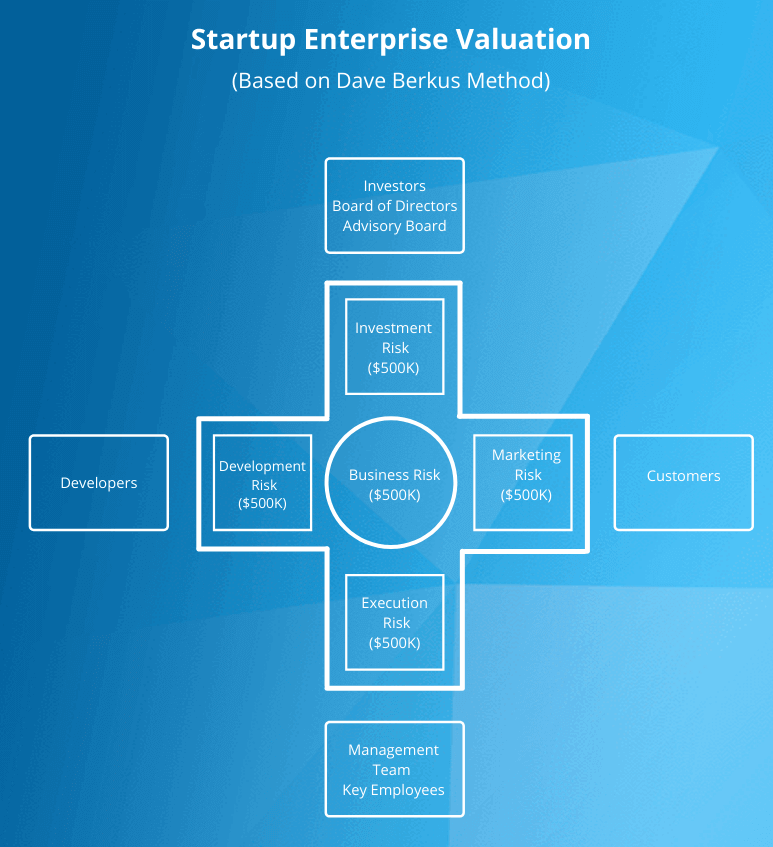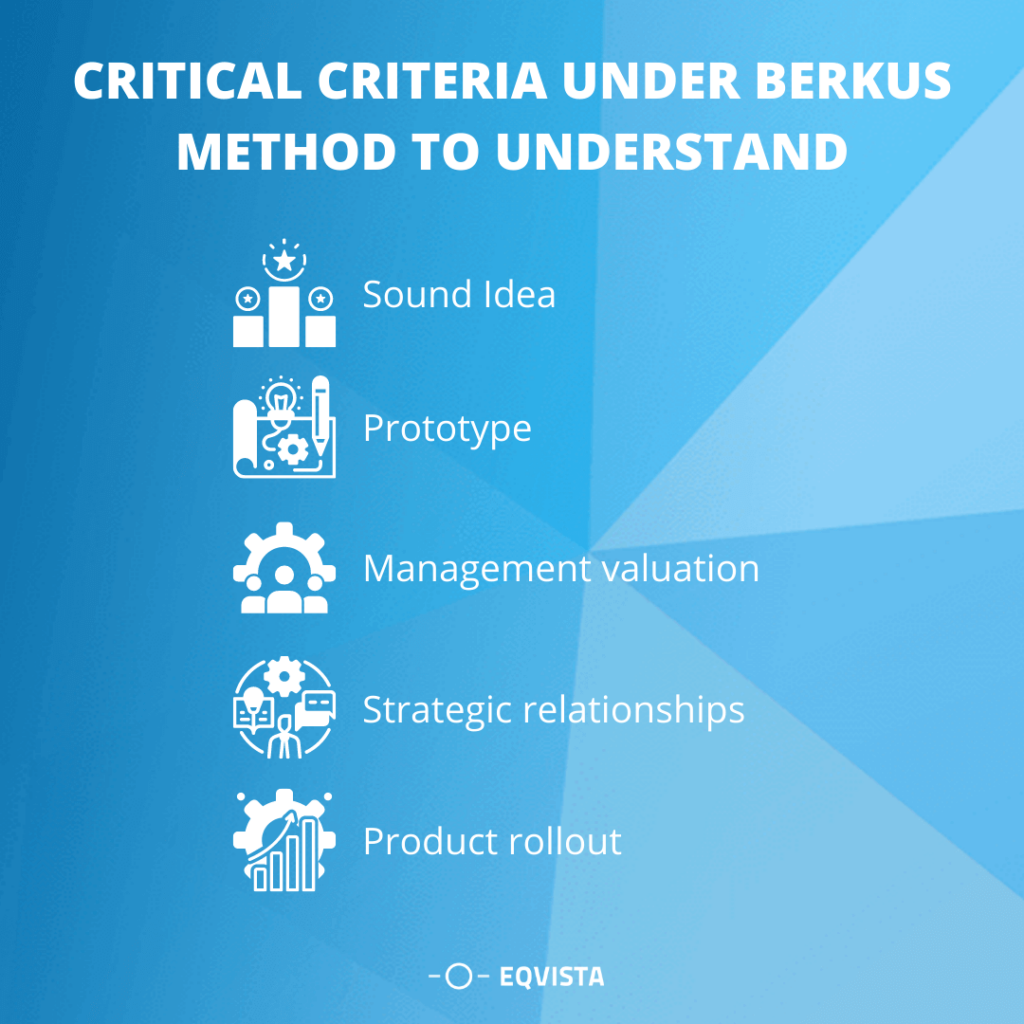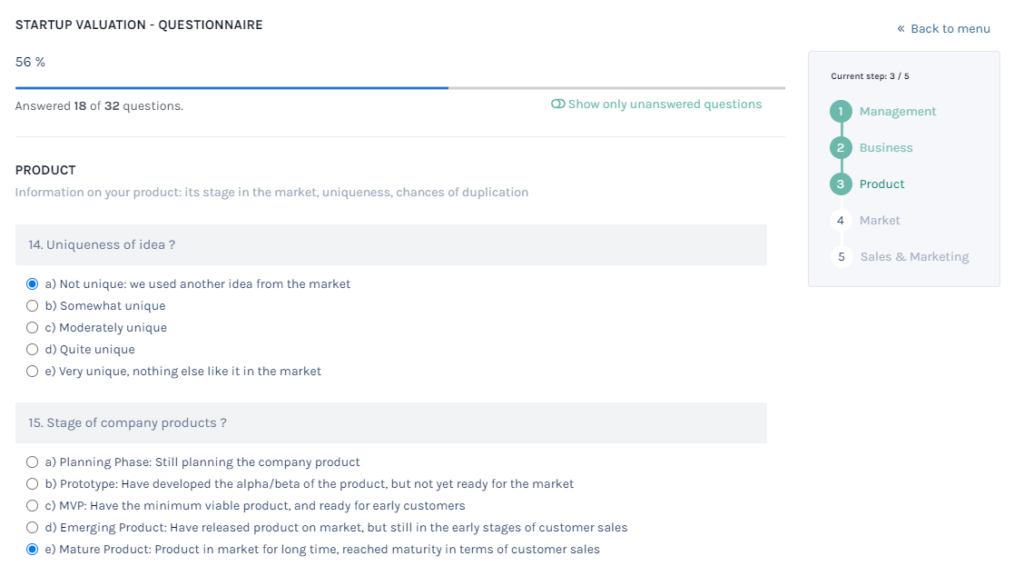Berkus Valuation Method for Startups
Evaluating a company’s value can be very challenging. Some founders want the highest valuation based on optimistic future revenues. On the other end, some investors prefer lower valuation methods based on current revenues. The final valuation will depend on how founders and investors agree on valuation. Different methods are used for valuing early-stage companies. One of the best pre-revenue startup valuation methods is the Berkus method.
The Berkus method offers budding entrepreneurs and early-stage investors a straightforward framework that allows them to focus on the risk factors rather than final projections to estimate a pre-revenue startup. However, this method’s integrity is not a replacement for the startup’s need to conduct comprehensive due diligence.

Berkus Valuation Method
The Berkus method calculates company value before their first revenue. In the 1990s, Dave Berkus first developed this method. He is a well-known angel investor and venture capitalist in the US. Let us study more about Berkus method valuation and know about it in-depth.
What is the Berkus method of valuation?
Berkus Method of Valuation is an early-stage valuation method that was explicitly created to find a starting point without relying upon the founder’s financial forecasts. The Berkus Method studies five crucial areas of a startup and indicates a value ranging from zero to $500,000 for each area. These areas are:
- Sound Idea: Eg: $0 – $500,000: The company has an exciting business idea.
- Quality Management Team: Eg: $500,000 – $1,000,000: The company has assembled an excellent management team.
- Prototype: Eg: $1,000,000 – $1,500,000: The company has a solid product or prototype that attracts customers.
- Strategic Relationships: Eg: $1,500,000 – $2,000,000: The company has powerful strategic alliances, partners, or a burgeoning customer base.
- Product Rollout or Sales: For eg: $2,000,000 – $2,500,000: The company has signs of revenue growth and a pathway to profitability
The sum of all the values designated results in the pre-money valuation for the startup. The Primary Berkus method had five areas with a maximum of $500k, which led to a theoretical maximum pre-money valuation of $2.5 million.

Thus, an essential modification to the Berkus Method is to adjust the theoretical maximum. This modification is to make it more flexible, both in terms of the areas and the amounts. The area includes the geographical region and the amount is the average valuation for a given startup. For instance, the average valuation for a given startup is $6 million, and then all the five areas would get up to 20% of $6M. This would result in $1.2 million each instead of $500k each. The criteria are as follows:
| Characteristic | Add to Pre-money Valuation |
|---|---|
| Quality Management Team | Zero to 0.5million€ |
| Sound Idea | Zero to 0.5million€ |
| Working Prototype | Zero to 0.5million€ |
| Quality Board of Directors | Zero to 0.5million€ |
| Product Rollout or Sales | Zero to 0.5million€ |
Here the monetary sum of the components is equal to the base pre-money valuation, and we can end up with a pre-money valuation of $0 or $2.5 million based on the chosen amounts. Suppose an entrepreneur wants to use a stand-alone valuation. In that case, it is advised to have a strong knowledge of pre-money valuations of early-stage startup peers per industry, as there are no quantitative factors, multiple performance numbers to work from. The Berkus method is considered to be an excellent supplement to the Venture Capital Method of pre-money valuation. This is because the Venture Capital Method concentrates heavily on industry quantitative data and forgoes the qualitative factors followed by the criteria mentioned above.
Why do early-stage startups choose Berkus method as a preferred valuation method?
Most companies do not meet their financial projections and respond to the companies’ poor track record to meet their financial targets. Know that the economic predictions must not rely on startup valuation purposes. The Management assumes that the aggressive revenue growth includes unrealistic profit margins. This is one reason why banks conduct sensitivity analysis to evaluate a company’s repayment capacity and why the Berkus method approaches startup valuation from a risk perspective.
The Berkus valuation method allocates a value to the business idea and the four principal success factors of the company. Each category counts for a maximum of $500,000. The critical value drivers designate risk areas that can make or break the company. These principal risks demand to be managed carefully in case the company is to become successful. The moment a company’s key risks are reduced, the value of the company increases. Therefore, the reduction in risk and valuation of the company go side by side. Berkus’ method is suitable for very young, pre-revenue startups and is not appropriate to value a company with recurring revenue streams.
Critical Criteria Under Berkus Method to Understand
The Critical Criteria Under Berkus Method that you need to understand are given below:

- Sound Idea: An idea or a course of action is one thing that every startup begins with. A startup is eventually an idea that is derived from the founder. This idea is considered when it has the potential to solve an unsolved problem. It can also update the current business model of the target industry. One big mistake that a startup performs when validating an idea is massive expenditure. The startup must conduct a final evaluation with a more extended target audience. The startup must check the:
- Proprietary nature of the idea – A business idea needs to have the potential to be secured via patents/ copyrights and possess the scope to produce significant returns.
- A well-defined plan for the future– Investors have a keen eye on the big picture while investing. Hence, promising startup longevity in a well-planned direction becomes essential.
- The scalability of the idea – a scalable business can expand with minimal incremental costs. Thus, for a startup to survive in a competitive market , it must have a scalable idea.
- Socio-political relevance – the appeal of the startup idea to the general audience relies heavily on the prevailing socio-political climate. Thus the idea of being relevant is necessary.
- Validation of idea – To minimize the risk during the implementation stage, the idea must be subjected to thorough experimentation with a large audience.
- Prototype: The prototype is the critical parameter under the valuation of startups by the Berkus method. It is a replica of the actual concept or product to test its viability. The primary notion of prototyping is to face the identified loopholes before any bulk investment such as energy, money, and time. Startups must not underestimate the importance of the prototype, as it proves the functionality of the product. It also acts as a technological risk management technique for startups. Numerous technology risks associated with IT products like breaching confidential data, system/service breakdowns, cyber-attacks, and many more have a bearing on the reputation of a business.
- Management valuation: A venture capitalist or angel investor would first check the founder’s domain experience or track record. In case the business founder has achieved a reputation in the domain concerning the startup, it would be of higher weightage in terms of the management’s valuation. This presents a sense of security regarding the management’s efficiency. The running of a team boils down to two words- Good management. Higher the capability of the administration, the higher the valuation.
- Strategic relationships: It is said that business is all about relationships, and how well you build them determines how well they do your business. Strategic relationships are defined as collaborations between two or more parties to achieve mutual benefits. A Startup usually enters into strategic relations with huge and well-established parties to exploit their expertise and resources. It is often seen that chains of production/distribution are incomplete in startups and leverage these relationships to ensure smoother rollout/functioning.
- Product rollout: Product rollout is the last stage of the development process. It is an imperative factor that defines a startup’s progress or failure. The product rollout depends on the market size in which you will roll it out initially and occur in a limited or global market. It is an internal analysis of the ability of a startup to market and sell its product. The rollout process starts from pre-launch to post-launch activities. The company’s founder must plan a rollout diligently; a product protocol must be made which benefits the target audience. The success of rollout is a signal for the future expansion of the company.
Advantages of Berkus Valuation Method
The main benefits of the Berkus valuation method are:
- The Berkus Method is a straightforward model solely based on qualitative aspects. This makes it a traditional way to value pre-revenue startups. The technique delivers a rough valuation estimate.
- To fit your circumstances, you can easily modify the model.
- The method makes the user think about corporate governance and risk management topics, such as the company’s strengths and weaknesses, whether the management team possesses the skills and competencies to deliver, how the startup deals with conflicts between the founders, etc.
- It provides founders and early-stage investors (business angels, venture capital funds, and crowdfunding backers) with a quick and straightforward valuation method.
Limitations of Berkus Valuation Method
The main limitations are:
- The simplicity of this method is both its strength and weakness. Therefore, founders and investors must realize that the startup valuation has its own limitations. Furthermore, founders and investors have opposing interests while discussing a potential investment deal. Founders seek profit from high valuations, while investors benefit from a low valuation. One can theoretically complete a Berkus valuation exercise within minutes. Nevertheless, it is vital to understand the business risk profile, key risks, and risk mitigants of the company.
- The method ignores pitfalls for startups: financial risk. While there is good evidence for this approach, a complete financial plan is still required for any business to assess its capital requirements and better understand its dynamics.
Get your accurate startup valuation in minutes with Eqvista
Eqvista’s startup valuation software makes use of different valuation methodologies including the Berkus Method. Since it’s a method that values a pre-revenue startup, we included the Berkus Method in our state of the art startup valuation. You can get a valuation for your startup in minutes by answering a set of questions covering 5 areas of your business.

Why should you choose Eqvista as the best partner to value your software?
All in all, the Berkus valuation method is a straightforward, flexible, and user-friendly valuation method for pre-revenue startups. It offers a valuable methodology to angel investors and startup entrepreneurs to evaluate startups in the earlier stages. It would help if you involved a professional in case you need any help. Eqvista is backed by professionals that will help you evaluate your business, both with startup valuation methods and 409a valuations. Eqvista also provides tools to assist you, such as cap table management and shareholder management.
Looking for a valuation for your startup? Valuations can be pricey, but with Eqvista’s startup valuation, you can get an affordable valuation that suits your business needs. Our startup valuation is hassle free and can be done in minutes. Check out a sample startup valuation report before you get started. Contact us to learn more!
